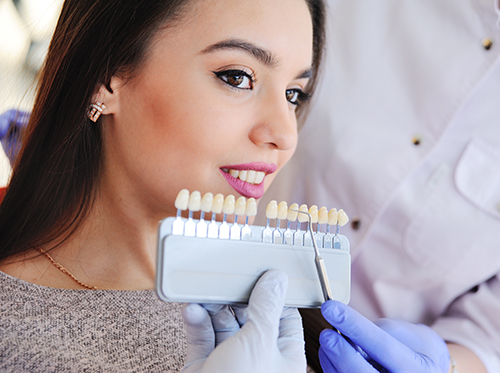November 4th, 2020

Children’s oral health differs from the needs of adults in many ways. It’s vital for you to understand what your child needs to keep his or her teeth healthy. Dr. Vincent Cardinale and Dr. Chris Moody and our team are here to answer your questions to set you and your little one up for success.
In-home dental care should start as soon as your baby show signs of developing that first tooth. At around age one or two, bring your son or daughter to our Naples, FL office. Dr. Vincent Cardinale and Dr. Chris Moody will examine your child’s tooth development and gum health.
The initial appointment will focus on getting your youngster familiar with our office and comfortable with our staff. We will go over several general matters during that first visit:
- Inspect for signs of decay or other tooth or gum problems
- Check for gum disease or cavities
- Examine your child’s bite and possible misalignment
- Clean the teeth, and apply fluoride if your child is old enough
- Talk with parents about proper oral health
- Give you tips for brushing and flossing your little one’s teeth
- Answer any questions you may have about caring for your son or daughter’s teeth
Once your child is old enough for the first dental visit, you should schedule regular cleanings every six months. Call our Naples, FL location if you have any conflicts or questions.
October 28th, 2020

Like many other parts of the human body, teeth age. You may look at old photos and realize your smile was significantly brighter in the past than it is now. Many adults experience tooth discoloration and find it embarrassing.
The good news is there are treatment options! The first step to recovering your bright smile and finding appropriate treatment is to determine what’s causing the discoloration.
There are multiple reasons for tooth discoloration. Some are under your control, but unfortunately, others may not be. Glance at the list below and see if you can pinpoint the cause of your tooth discoloration.
- Poor Dental Hygiene: This one is obvious. There’s a reason your parents (and dentist) always told you to brush and floss three times a day.
- Genetics: A big part of your dental health is determined by genetics; in other words, what runs in your family. Sometimes people inherit naturally discolored teeth.
- Diet: Do you eat sugary foods often? Drink lots of soda? Gulp more than two cups of coffee a day? Are you an energy drink fan? We’re not pointing any fingers ... but you should do the math.
- Tobacco: Because cigarettes contain nicotine, they can readily stain your teeth. So hardcore smokers often develop prominent brown stains.
- Medications: Medicines such as doxycycline, tetracycline, antihistamines, blood-pressure medications, and antipsychotic drugs can all create tooth discoloration as a side effect. (If you suspect this could be the case for you, don’t ever discontinue your medication without consulting your doctor first!)
Did you find the culprit? Perhaps the easiest way to avoid tooth discoloration in your case might be to make some simple adjustments to your diet and other habits.
Also, when you consume drinks or foods that are high in acid or sugar content, take a moment to rinse your mouth with water afterward. If you’re an avid tobacco user, you may want to reconsider that; especially because it can have deadly effects that go way beyond your smile.
Dr. Vincent Cardinale and Dr. Chris Moody can also suggest other treatment options. While over-the-counter agents do help, in-office whitening treatments tend to be more effective. If whitening agents don’t alleviate the problem, you may want to consider bondings or veneers.
If you’re worried about discoloration of your teeth, or have any questions about how to treat it, please feel free to reach out to our Naples, FL office! We can help you identify what may be causing the problem and work with you to give you a smile you’ll be proud of.
October 21st, 2020

Baby teeth come with a built-in expiration date. That charming first smile is meant to make way for a healthy, beautiful adult smile. Unfortunately, before they are ready to make way for permanent teeth, primary teeth can be affected by decay, trauma, or infection—problems which can lead to damage to the pulp within the tooth. If your dentist tells you that your child’s tooth needs specialized endodontic treatment, is treatment really that much better for your child than losing a baby tooth prematurely?
Quite often, the answer is yes!
Baby teeth do much more than serve as temporary stand-ins for adult teeth. They are essential for:
- Biting and chewing—a full set of baby teeth helps your child develop proper chewing, which leads to healthy digestion. And chewing also helps build face and jaw muscles.
- Speech development—primary teeth help guide speech production and pronunciation.
- Spacing—a baby tooth serves as a place holder for the adult tooth waiting to arrive. If a primary tooth is lost too early, the remaining baby teeth may drift from their proper location. This, in turn, can cause overcrowding or misalignment of the permanent teeth when they do erupt.
Baby teeth, like adult teeth, contain living pulp tissue. The pulp chamber inside the crown (the visible part of the tooth) and the root canals (inside each root) hold nerves, blood vessels, and connective tissue. When the pulp is damaged by trauma or infected, a baby tooth can still be saved with endodontic treatment. Endodontic treatment in baby teeth can take two forms.
- “Vital” pulp is pulp that can be saved. Vital pulp therapy uses procedures to deal with damaged pulp inside the crown, or visible part, of the tooth. Pulp therapy can be used on teeth when only the top of the pulp has been affected by decay, limited exposure, infection, or trauma, but the root pulp remains healthy. Specific treatment will depend on the nature of the pulp injury, and a crown will usually be placed over the tooth after treatment to protect it.
- With non-vital pulp, your dentist will probably recommend a traditional root canal procedure. All of the pulp tissue will be removed from inside the crown and the roots, and the pulp chamber and root canals will then be cleaned, disinfected, shaped, and filled. Finally, because the treated tooth will be more fragile, a crown will be used to protect the tooth from further damage.
There can be good reasons for extracting a seriously damaged baby tooth, and there are situations where preserving the tooth is the best and healthiest option for your child. Discuss your options with Dr. Vincent Cardinale and Dr. Chris Moody when you visit our Naples, FL office for the safest, most effective way to treat your child’s compromised tooth.
October 14th, 2020

While Dr. Vincent Cardinale and Dr. Chris Moody and our team tell you daily oral hygiene habits, such as brushing and flossing, are essential to optimal oral health, regular dental checkups at Cardinale Dentistry ensure your teeth are treated to a deeper level of cleaning.
We recommend for most of our patients to have a cleaning at our Naples, FL office at least every six months. In addition to a thorough cleaning and polishing of your teeth, visits with Dr. Vincent Cardinale and Dr. Chris Moody help us detect and prevent the onset of tooth decay and gum disease, also known as periodontal disease. During your visit, we will check the health of your mouth, teeth, gums, cheeks, and tongue for signs of any decay or disease. We will also check old fillings and restorations as these can wear away over time due to chewing, clenching, or grinding.
If you are predisposed to any oral diseases, Dr. Vincent Cardinale and Dr. Chris Moody may recommend checking in with us more often than every six months. We want your teeth to get the professional attention they deserve! If you are overdue for your next cleaning, give us a call at our Naples, FL office to schedule a checkup! See you soon!





